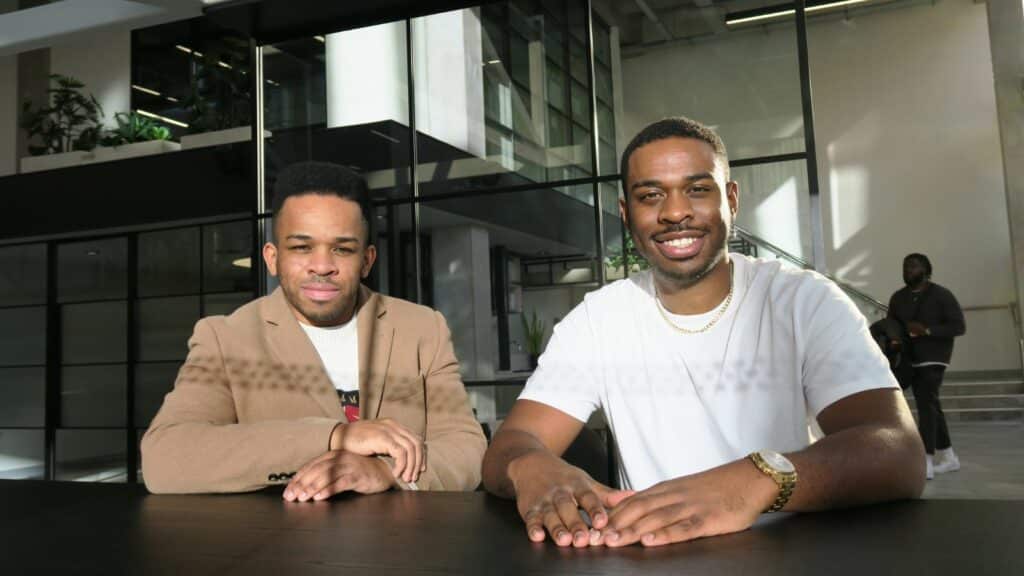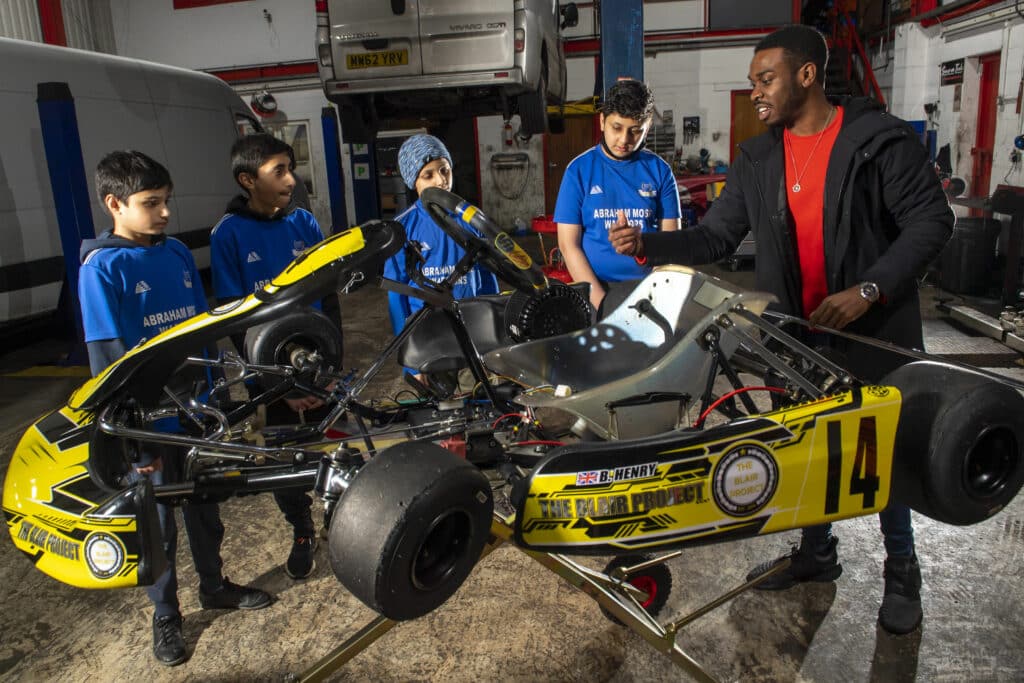What started out as a brotherly mission to make motorsport more inclusive and accessible ten years ago, has since become the catalyst for a number of pioneering diversity and sustainability projects in Manchester.
“I’ve always been big into trying to make the world cleaner and greener, and getting more young people that look like me interested in careers within the green tech sector,” Nile Henry, founder and CEO at The Blair Project, tells Prolific North.
At just 18-years-old, Nile Henry launched social enterprise The Blair Project after he was inspired by his younger brother, Blair, and his motorsport dreams. As a former go karter, Blair soon realised it was a “very expensive hobby to get into”. Often seen as an elitist sport, he says it excludes around “99% of families”.
“Realistically, if you want to get into Formula 1 as a driver, you have to come from a very wealthy family. My mission was looking at how we make motorsport more affordable, accessible and diverse?” says Henry.
“That was the main ambition of The Blair Project. We also wanted to make motorsport more inclusive, so anyone could take part. The best way to do that was to run programmes in schools, where young people can build their own petrol and electric go karts.”

The Blair Project offers disadvantaged young people hands-on opportunities to convert petrol go karts into electric karts, equipping them with the skills to pursue careers in digital, tech and engineering.
“We run the project over a three-month period for young people to retrofit a petrol go kart and turn it into a fully electric go kart, they then test, race and compete with them. Motorsport is a fun sport to get into, but how do you make STEM learning fun? We can use motorsport as a tool to do that.
“Not only are young people learning about batteries, motors and aerodynamics, they’re learning communication, creative and problem-solving skills.”
Around 2018, The Blair Project launched an advanced motorsport competition called ProtoEV STEM challenge for schools, colleges, youth clubs and apprentices in the UK. With a mission to make motorsport from a go karting level more sustainable, it also builds career pathways for those from disadvantaged backgrounds in STEM subjects and green technology.
“I couldn’t find a role model…”
Their work was recognised in a report commissioned by F1 star Lewis Hamilton called The Hamiliton Commission, which discovered just 1% of employees in Formula 1 are from black backgrounds in the UK.
But it’s not just in motorsport that it’s a problem. “Before I set up my business, I was looking for role models within the science and engineering space that I could aspire to be like. I couldn’t find a role model,” he explains.
“To this day, I go to a lot of engineering and tech events and it’s like ‘spot the black or Asian person in the room’. I decided that if I couldn’t find a role model, maybe I could be that role model.
“I want to show young people from black, Asian, ethnic minority backgrounds, or kids from lower socio-economic backgrounds, that you too can be involved in this space.”
As a family-run business, the small team of 11 are constantly thinking up ideas to build a diverse talent pipeline and develop sustainability projects.
One of those projects is developing ProtoEV NxtGen, a gamified educational AR app. Teaming up with Fuzzy Logic Studio in the North East, it’s set to turn The Blair Project’s existing ed tech STEM challenge into an app and teach more underrepresented young people how to convert virtual go karts into fully electric e-karts while educating them about battery technologies, data and analytics.
“They are helping to create our online learning edtech platform that will allow us to train people not just in the UK, but globally as well. It’s all about changing lives and making a difference.”

Launched in September, the app is currently being trialed with schools and colleges across the UK. The next step is to look at raising investment to develop a recruitment tool on the app, for prospective employers to tap into this new talent pipeline and offer opportunities for young people.
The pioneering ideas don’t end there. In 2020, The Blair Project secured £4m of UK government funding for its new spin out company, Manchester Innovation Activities Hub (MIAH).
Set to open in May at Bruntwood SciTech’s BASE building in Manchester, the new net zero industrialisation and skills training facility is set to incubate start-ups and help develop talent in the region.
“It’ll be the first centre of its kind,” says Henry. “We’ll have space on the ground floor where we’ll have the latest and greatest industrial grade equipment where small to medium-sized companies can come in and use the equipment and prototype new products to help the UK reach its net zero objectives.”
It will be open up to people across the local community to get upskilled and reskilled in transport, manufacturing and renewable energy technologies to help them “progress” into jobs across the green tech sector.
It will be “game-changing”
“What started as encouraging young people to get interested in green careers by using motorsport as a fun way to get involved, has now spun out into this new innovation center to get adults trained up for these new emerging jobs.
“MIAH will be game-changing for us because The Blair Project is predominantly a youth focused company, working with young people from the age of 11 to 19. MIAH is the next step in that evolution.”
After securing some funding from Innovate UK, The Blair Project has another tech project in the pipeline called Nilean, a hydrogen ed tech platform.
A play on his name and the river Nile, the vision is for Nilean to become the “go-to platform” for hydrogen skills training. The team is currently in discussions for the platform to take the platform over to seven countries in Africa and will be ready in March 2025.
“It’s about spotting trends and opportunities. The government made an announcement in 2022 that they were pumping over £500m into hydrogen. We’ve seen the direction they’re going in and if we’re going to build more hydrogen plants, we’re going to need to develop that workforce.”
Although The Blair Project is a non-profit and has seen success, he acknowledges how difficult it has been as a black-owned business to raise investment for its private ventures.
“With The Blair Project, it has been hard for us to raise any social investment. We receive small amounts of social investments and sponsorship, but it’s often hard to raise that amount of money.
“On our private ventures, with MIAH we were able to receive the £4m from the government but it’s been hard to raise the revenue funding. Only 1% of black-owned companies receive VC funding, so it does make it difficult if you’re a diverse founder.
“A lot of our success has been from developing relationships with government departments, bid writing and winning Innovate UK contracts or public sector contracts.”
Now, at the age of 28, he sees the ultimate goal for The Blair Project to become the world’s “leading” green tech, education and skills provider.
“For us, it’s all about diversifying the STEM workforce. No matter where you are, no matter what your race, gender, or background or disability, you can get involved within the green revolution.
“That’s our vision and mission. Fingers crossed we achieve that and no one is excluded from the crazy amount of opportunities that will be coming over the next few years.”












